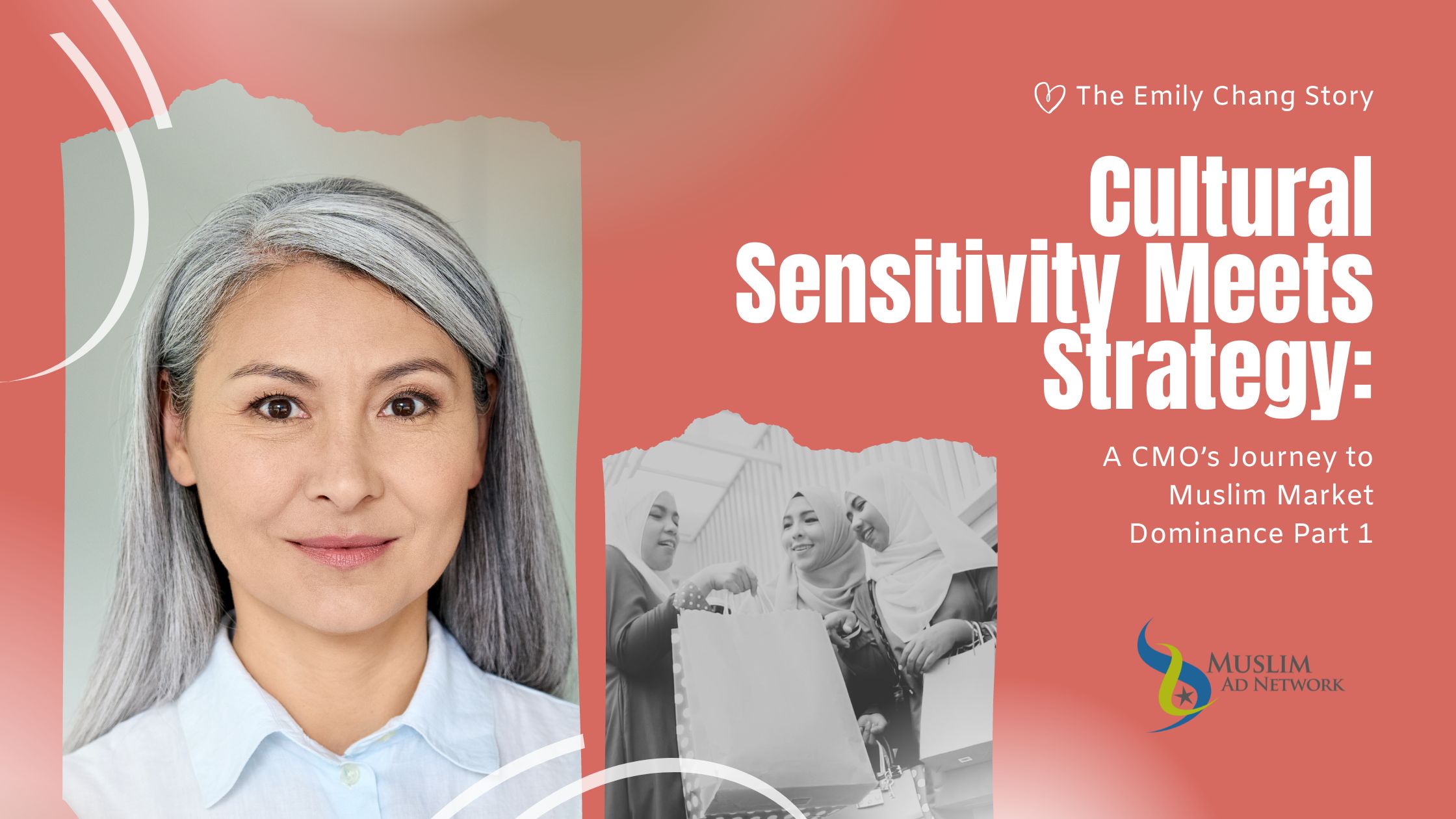
Disclaimer: The character of Emily Chang is fictional and created for the purpose of this blog post. Her story is designed to provide an illustrative and pragmatic approach to understanding the strategies and challenges faced by CMOs in penetrating the Muslim market.
Emily Chang: Exploring the Untapped Potential and Challenges of the Muslim Market
Meet Emily Chang, the dynamic Chief Marketing Officer at GOALIATH, a multinational consumer goods corporation. Emily is known for her strategic vision and leadership, and she is always on the lookout for new market opportunities to sustain and increase GOALIATH’s global market share. But you see, Emily Chang had a problem.
The Untapped Potential
Emily realized that the $2 trillion Muslim market was a significant opportunity due to its purchasing power and influence. However, she knew that traditional marketing tactics wouldn’t suffice. To succeed, she needed culturally sensitive and inclusive strategies.
Key considerations included Halal certification and compliance, ensuring products met religious standards. Emily also recognized the diversity within the Muslim market, requiring tailored strategies that balanced global brand consistency with local cultural relevance.
Read: Embracing Diversity in Halal Advertising: A Necessity, Not an Option
Overcoming stereotypes and misconceptions was another challenge. Emily aimed to develop marketing campaigns that respected and reflected Muslim values, avoiding any missteps that could harm the brand’s reputation.
Emily’s strategic approach focused on understanding and honoring the values of the Muslim community to unlock the market’s potential.
Understanding the Muslim Market
Emily knew that, to succeed, she needed to understand the demographics, purchasing power, and key cultural and religious considerations of the Muslim market. This market was not only vast but also diverse, with varying cultural norms and values across different regions. Emily had to ensure that her marketing efforts respected these values and communicated them clearly and respectfully. Adherence to the Islamic advertising principles was paramount.
Balancing Global Brand Consistency with Local Cultural Relevance
Maintaining a consistent global brand image while adapting to local cultural norms was no easy feat. Emily needed to develop strategies that balanced global consistency with local relevance by leveraging local cultural insights. This meant creating marketing campaigns that resonated with local audiences while still aligning with GOALIATH’s overall brand identity. It required a delicate balance of understanding local customs, traditions, and consumer behavior and integrating these insights into the brand’s global strategy.
To achieve the balance between maintaining a consistent global brand image and adapting to local cultural norms, Emily took several strategic steps:
1. Conducting In-Depth Market Research
Emily initiated comprehensive market research to gather insights into the local customs, traditions, and consumer behavior of the Muslim market. This involved studying cultural, social, and religious factors that influence purchasing decisions. By understanding these nuances, Emily could tailor marketing strategies to resonate with local audiences.
2. Collaborating with Local Experts
Emily collaborated with local marketing experts and cultural consultants who had a deep understanding of the Muslim market. These experts provided valuable insights and guidance on how to adapt GOALIATH’s marketing campaigns to align with local cultural norms while maintaining the brand’s global identity.
3. Developing Culturally Relevant Campaigns
Using the insights gained from market research and local experts, Emily developed marketing campaigns that were culturally relevant and respectful. These campaigns highlighted GOALIATH’s commitment to inclusivity and understanding of the Muslim community’s values. By doing so, Emily ensured that the brand’s messaging resonated with local audiences.
4. Ensuring Consistent Brand Messaging
Emily worked closely with her team to ensure that the core brand messaging remained consistent across all markets. This involved creating a unified brand narrative that could be adapted to different cultural contexts without losing its essence. By maintaining a consistent brand voice, Emily ensured that GOALIATH’s global identity was preserved.
5. Leveraging Local Influencers
Emily partnered with local influencers who were highly respected and had a strong presence within the Muslim community. These influencers played a key role in amplifying GOALIATH’s marketing messages and fostering trust with local consumers. By utilizing their influence, Emily successfully strengthened the connection with the target audience.
6. Monitoring and Adapting Strategies
Emily continuously monitored the performance of the marketing campaigns and gathered feedback from local consumers. This allowed her to identify any areas that needed improvement and make necessary adjustments. By staying agile and responsive, Emily ensured that GOALIATH’s marketing strategies remained effective and relevant.
By taking these steps, Emily successfully balanced global brand consistency with local cultural relevance, allowing GOALIATH to effectively penetrate the Muslim market while respecting and honoring its values.
Navigating Diverse Cultural Norms and Values
Different regions had unique cultural norms and values that had to be respected. Muslims in Australia may not have the same cultural norms as those in the United Kingdom for example. This can be the case even if both groups originated from the same immigrant background; especially with the younger generation.
Missteps could lead to backlash and damage to the brand’s reputation. Emily needed comprehensive market research to understand consumer behavior and preferences in each region. This involved studying the cultural, social, and religious factors that influenced purchasing decisions and tailoring marketing strategies accordingly. By doing so, Emily aimed to build trust and credibility with Muslim consumers, ensuring that GOALIATH’s products and services were perceived as authentic and respectful.
To address the unique cultural norms and values of different regions, Emily took several strategic steps:
1. Conducting Regional Market Research
Emily initiated comprehensive market research specific to each region. This involved gathering data on cultural, social, and religious factors that influenced consumer behavior and preferences. By understanding these regional nuances, Emily could tailor marketing strategies to resonate with local audiences.
2. Engaging with Local Communities
Emily engaged with local communities to gain firsthand insights into their cultural norms and values. This included attending local events, participating in community activities, and conducting focus groups. By building relationships with local communities, Emily was able to gather valuable feedback and understand their unique needs and preferences.
3. Customizing Marketing Campaigns
Using the insights gained from regional market research and community engagement, Emily customized marketing campaigns to align with local cultural norms. This involved creating region-specific content that reflected the values and traditions of the local audience. By doing so, Emily ensured that GOALIATH’s marketing efforts were perceived as authentic and respectful.
4. Training and Sensitizing the Marketing Team
Emily provided training and sensitization programs for her marketing team to ensure they understood the cultural nuances of each region. This included educating the team on cultural sensitivities, religious practices, and social norms. By fostering cultural awareness within her team, Emily ensured that all marketing efforts were respectful and considerate.
5. Collaborating with Local Influencers and Partners
Emily teamed up with local influencers and partners who possessed a deep understanding of the regional culture. These influencers and partners were instrumental in amplifying GOALIATH’s marketing messages and establishing trust with local consumers. By leveraging their influence, Emily succeeded in forging a stronger connection with the target audience.
6. Monitoring and Adapting Strategies
Emily continuously monitored the performance of the marketing campaigns and collected feedback from local consumers. This enabled her to pinpoint areas needing improvement and make necessary adjustments. By staying agile and responsive, Emily ensured that GOALIATH’s marketing strategies remained effective and relevant.
Through these efforts, Emily adeptly navigated the diverse cultural norms and values of different regions, building trust and credibility with Muslim consumers. As a result, GOALIATH’s products and services were perceived as authentic and respectful.
Overcoming Stereotypes and Misconceptions
Stereotypes and misconceptions about the Muslim market could hinder effective marketing. Emily had to develop culturally sensitive marketing campaigns that respected and reflected Muslim values. This involved challenging existing stereotypes and promoting a more accurate and positive representation of the Muslim community. Emily’s goal was to create marketing messages that resonated with Muslim consumers on a deeper level, fostering a sense of inclusion and respect. By doing so, she aimed to build a strong and loyal customer base within the Muslim market.
To address stereotypes and misconceptions about the Muslim market, Emily took several strategic steps:
1. Conducting Cultural Sensitivity Training
Emily organized cultural sensitivity training for her marketing team to ensure they understood the values and beliefs of the Muslim community. This training helped the team recognize and challenge existing stereotypes, fostering a more respectful and inclusive approach to marketing.
2. Engaging with the Muslim Community
Emily actively engaged with the Muslim community to gain a deeper understanding of their values, aspirations, and concerns. This involved participating in community events, collaborating with Muslim organizations, and conducting focus groups. By building relationships with the community, Emily gathered valuable insights that informed her marketing strategies.
3. Creating Authentic and Respectful Campaigns
Using the insights gained from community engagement, Emily developed marketing campaigns that were authentic and respectful. These campaigns aimed to reflect the true values and aspirations of the Muslim community, challenging stereotypes and promoting a positive representation. Emily ensured that the messaging resonated with Muslim consumers on a deeper level, fostering a sense of inclusion and respect.
4. Highlighting Positive Stories and Role Models
Emily concentrated on highlighting positive stories and role models within the Muslim community. She showcased the achievements and contributions of Muslim individuals and groups to counter negative stereotypes and promote a more accurate and positive image. This strategy strengthened the connection with the target audience and fostered a sense of pride and belonging.
5. Collaborating with Influencers and Advocates
Emily collaborated with prominent Muslim influencers and advocates who were well-regarded within their community. Their involvement helped to amplify GOALIATH’s marketing messages and establish trust with Muslim consumers. Utilizing their influence, Emily fostered a more authentic and relatable connection with the target audience.
6. Monitoring and Adapting Campaigns
Emily continuously monitored the performance of the marketing campaigns and gathered feedback from the Muslim community. This allowed her to identify any areas that needed improvement and make necessary adjustments. By staying agile and responsive, Emily ensured that GOALIATH’s marketing strategies remained effective and respectful.
By taking these steps, Emily successfully developed culturally sensitive marketing campaigns that respected and reflected Muslim values. This approach helped challenge existing stereotypes, promote a more accurate and positive representation of the Muslim community, and build a strong and loyal customer base within the Muslim market.
Here is a side-by-side comparison of the steps CMOs can take to ensure each challenge of penetrating the Muslim market is met pragmatically and head-on. There is some overlap in some cases but the idea behind the strategy is tailored to the desired outcome for that particular challenge.
| Balancing Global Brand Consistency with Local Cultural Relevance | Navigating Diverse Cultural Norms and Values | Overcoming Stereotypes and Misconceptions |
| Conducting In-Depth Market Research | Conducting Regional Market Research | Conducting Cultural Sensitivity Training |
| Collaborating with Local Experts | Engaging with Local Communities | Engaging with the Muslim Community |
| Developing Culturally Relevant Campaigns | Customizing Marketing Campaigns | Creating Authentic and Respectful Campaigns |
| Ensuring Consistent Brand Messaging | Training and Sensitizing the Marketing Team | Highlighting Positive Stories and Role Models |
| Leveraging Local Influencers | Collaborating with Local Influencers and Partners | Collaborating with Influencers and Advocates |
| Monitoring and Adapting Strategies | Monitoring and Adapting Strategies | Monitoring and Adapting Campaigns |
Tune in to the second part to read about the internal strategies and challenges theat Emily faced, in attempting to penetrate the Muslim market.
Conclusion
Emily’s journey to penetrate the Muslim market was challenging but rewarding. By embracing culturally sensitive marketing and partnering with experts, she was able to unlock the potential of the $2 trillion Muslim market. The result? GOALIATH saw a significant increase in market share, revenue growth, and brand loyalty within the Muslim market. Now, it’s your turn. Are you ready to take the leap and achieve success in this untapped market?
[button text=”start targeting muslim consumers” color=”success” style=”shade” size=”xxlarge” animate=”blurIn” radius=”10″ depth=”4″ depth_hover=”5″ link=”https://muslimadnetwork.com/get-started/”]